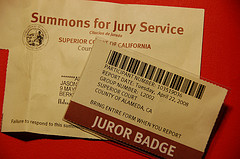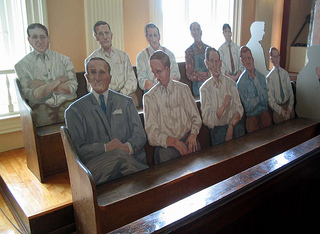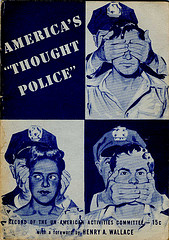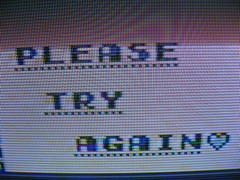 A survey of jurors from 15 trials
has found that jurors generally understand instructions not to use the
Internet or social media to research or communicate about trials, but
also that many jurors wish they could use technology to do some sort of
research about
A survey of jurors from 15 trials
has found that jurors generally understand instructions not to use the
Internet or social media to research or communicate about trials, but
also that many jurors wish they could use technology to do some sort of
research aboutCopyright 2007-25 Digital Media Law Project and respective authors. Except where otherwise noted,
content on this site is licensed under a Creative Commons Attribution-Noncommercial-ShareAlike 3.0 License: Details.
Use of this site is pursuant to our Terms of Use and Privacy Notice.
content on this site is licensed under a Creative Commons Attribution-Noncommercial-ShareAlike 3.0 License: Details.
Use of this site is pursuant to our Terms of Use and Privacy Notice.


 In August 2011,
In August 2011,  On Wednesday, the U.S. Court of Appeals for the Fourth Circuit issued its
On Wednesday, the U.S. Court of Appeals for the Fourth Circuit issued its 
 There have several recent developments which mark a milestone in the
evolution of social media platforms: their acceptance as mainstream
forms of communication, on equal footing with older forms of
communicating official or "important" messages.
There have several recent developments which mark a milestone in the
evolution of social media platforms: their acceptance as mainstream
forms of communication, on equal footing with older forms of
communicating official or "important" messages. As
As  On March 12, 2013, the Federal Trade Commission released a new guidance paper entitled "
On March 12, 2013, the Federal Trade Commission released a new guidance paper entitled " I've already written several posts about the overblown predictions
that a
I've already written several posts about the overblown predictions
that a  For me, thinking about one of the Obama administration's latest initiatives to keep us all safe online is like one of those pattern recognition puzzles (you know, like "What is the next term in this sequence: O, T, T, F, F, S, S, E, N, __?"). Here, the sequence is:
For me, thinking about one of the Obama administration's latest initiatives to keep us all safe online is like one of those pattern recognition puzzles (you know, like "What is the next term in this sequence: O, T, T, F, F, S, S, E, N, __?"). Here, the sequence is:
 Arizona State Representative Michelle Ugenti (R-Scottsdale) introduced
Arizona State Representative Michelle Ugenti (R-Scottsdale) introduced  A Tulsa, Oklahoma girl and her mother
A Tulsa, Oklahoma girl and her mother  When using
When using  The federal courts have revised the jury instructions
The federal courts have revised the jury instructions  The judicial system in the United States has kept up with technological change in many ways. We have
The judicial system in the United States has kept up with technological change in many ways. We have 
Description:
The plaintiff, an 18-year old who aspires to be a rapper, posted lyrics on his Facebook page referencing the Boston Marathon bombings two weeks after the bombings occurred. D'Ambrosio also posted that the White House was a "federal house of horror." While his Facebook page has since been removed, in one line of the rap, D'Ambrosio wrote, "everyone you will see what I am going to do, kill people." D'Ambrosio also recorded a Youtube video and sent text messages that referenced the content of this rap.
On May 1, 2013, D'Ambrosio did not attend school, and at least one student, who had seen the Facebook post, notified school officials, who then notified police. D'Ambrosio was arrested one week after the Facebook post and charged with Communicating a Terrorist Threat under Mass. Gen. Laws c. 269, section 14, a felony charge that can bring up to 20 years in prison. According to Chief Solomon of the Methuen Police Department, D'Ambrosio did not make threats against particular individuals or the school in his rap. Judge Lynn Rooney of Lawrence District Court originally set D'Ambrosio's bail at $1,000,000 but this was subsequently revoked, and D'Ambrosio was held without bail.
On May 2, 2013, D'Ambrosio was arraigned in Lawrence District Court and, represented by his attorney Geoffrey DuBosque, plead not guilty on charges of making a bomb threat.
After D'Ambrosio's arrest, Fight for the Future and the Center for Rights posted a petition on their website entitled "Free Cameron D'Ambrosio!" The website detailed D'Ambrosio's arrest and argued for protection of D'Ambrosio's First Amendment privileges and freedom of speech on the internet. The petition received over 90,000 signatures.
On June 6, 2013, a grand jury refused to indict D'Ambrosio on a charge of making terrorist threats and Judge Rooney ordered that he be released on personal recognizance. On June 27, 2013, the charges against D'Ambrosio were officially dropped.